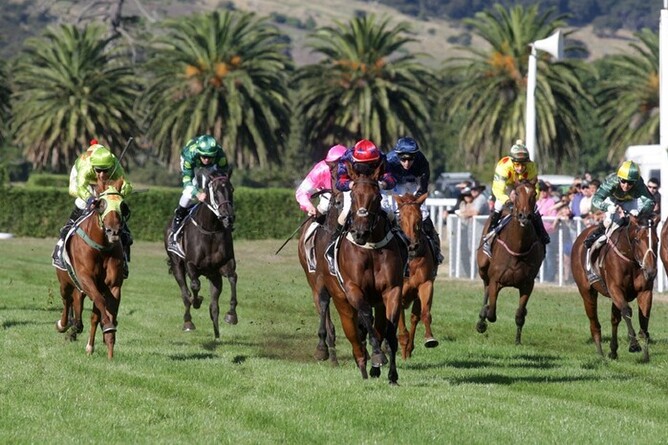There’s more than one good reason for the anticipation surrounding the 2021 edition of the country’s only Group One race for fillies and mares, the Fiber Fresh New Zealand Thoroughbred Breeders’ Stakes.
When entries were taken for the 1600-metre feature earlier this week, they numbered just nine, but what a quality line-up headed by eight-time Group One winner Avantage. For weeks the Jamie Richards-trained five-year-old has looked the obvious favourite but she’ll still have to earn that honour with rivals that include exciting four-year-old Levante, last-start Cuddle Stakes winner Coventina Bay, Group One winner Travelling Light and Group-placed Listed winners Siracusa and Tabata.
Saturday will be special for host club Racing Te Aroha, as this year marks the 50th anniversary of the race that has been won by a host of New Zealand’s best racemares – and one Australian, the Lee Freedman-trained, South African-bred 2009 winner Dane Julia. The prospect of celebrating the half-century milestone is in stark contrast to this time last year when Covid-19 forced the race to be abandoned. That explains why Saturday’s race will also be the 50th running of the Thoroughbred Breeders’ Stakes.
“It’s a fantastic milestone to see our flagship race reach its 50th anniversary, even if the 50th running is a year later than it should be,” said club president Wayne Lowen. “We had no control over things this time last year, but it’s great to know that we’re back with what promises to be a vintage edition.”
Don Hancock, who was secretary of the Te Aroha Jockey Club when the Breeders’ Stakes came into being in 1971, provided an insight to how it all came about when he was guest speaker at the club’s pre-race function on Tuesday evening.
“I put an idea to the committee for a race structure that was a new concept,” said Hancock. “The idea was to put up a stake of $9,000, which was a lot when you consider that open (staying) handicaps at a track like Te Aroha were $3,000 and open sprints $2,000.
“The club was well led by Clarry Swney and his committee approved of the idea, but it still had to gain sign off from various other bodies. To get sole rights to name the race the New Zealand Thoroughbred Breeders’ Stakes we needed the endorsement of the Breeders’ Association, but then the parochial elements started to raise their heads.
“It was suggested that Te Aroha could run the race in the first year, but then it would do the rounds from club to club. Thankfully, with the Breeders’ Association under the chairmanship of Wally Ormond, that idea didn’t get over the line.
“Then we had to go to the Auckland District Committee, knowing there could be opposition for what was considered a country club staging a race with a stake that was higher than races like the Great Northern Oaks, Easter Handicap and George Adams Mile. Once again someone with foresight, Dr McGregor Grant, was the referee and the race was given final approval.”
For the first New Zealand Thoroughbred Breeders’ Stakes on February 27, 1971, entries were called eight weeks in advance and attracted no less than 228 fillies and mares at $10 each. By prior agreement half of that money went to the Breeders’ Association and the remainder went towards the stake.
“It was a concept that worked when you consider that the 16 horses that made up the final field had a combined tally of 130 wins and their stakes collectively amounted to $280,000, which equates to something like $4 million in today’s currency,” added Hancock. “As an inaugural race built from nothing, it was a fantastic outcome.”
That very first New Zealand Thoroughbred Breeders’ Stakes was won by the three-year-old Battle-Waggon filly Breathalyser, from Woodville trained Ajasco (Pakistan ll) and Hasting filly Devante (Sobig). Breathalyser was trained at Awapuni by Alan Kaye and was ridden by John Riordan. She was raced on lease from her breeder Frank Wilson by Palmerston North lawyers Trevor de Cleene (later a Member of Parliament) and Bob Calkin, the name a play on their criminal defence work in the new age of roadside alcohol testing.
From instant success to becoming a fixture on Te Aroha’s late summer/autumn schedule, the New Zealand Thoroughbred Breeders’ Stakes was accorded Group Two status in 1979, the year that the Noel Eales-trained Oncidium mare Orchidra won the second of her record three titles. It was elevated to Group One in 2002 and was won by Wanganui mare Saint Cecile, who had also won the final Group Two edition. She is one of four dual winners alongside Tudor Light (1976-77), Waikiki (1990-91) and Aimee Jay (1998-99).
As its name implies, the New Zealand Thoroughbred Breeders’ Stakes is lynch-pinned to the country’s breeding fraternity, with an annual offering of donated stallion services bolstering club funds. That theme is further illustrated this year with the donation of a service to up-and-coming Rich Hill Stud stallion Proisir to the winner of the NZTBA members’ draw during that organisation’s raceday function.
“Talking with Proisir’s original owner Tony Falcone and other syndicate members, we agreed that it was the right thing to do and get behind the Breeders’ Stakes,” explained Rich Hill principal John Thompson, who is also president of the NZTBA. “We’re pleased to have an association with the race itself, plus it’s important that we support the Breeders’ Association as a means of encouraging membership and the important work that our organisation does.”
On a personal basis, Thompson would enjoy nothing more this weekend than to see Proisir’s daughter Levante add a Group One race to a seven from 10 record that already includes the Gr. 2 Westbury Classic.
“It won’t be easy up against mares like Avantage and Coventina Bay, but it would be another feather in Proisir’s cap if Levante was to become his first Group One winner.”


